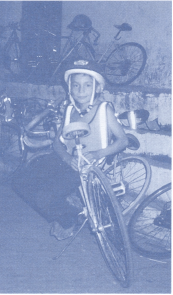 Naum Antonio Recina Halas was hooked as soon as the fleet of cyclists passed his shoulders, shouting as they navigated the concrete cobblestones of the town of Suchitoto, El Salvador. For three successive weeks at the same hour, they rode by, and Naum admired the confidence with which they made their way down the street on the way out of town. A second-grader himself, and still shy of eight, he could see that they were older, but as he knew some of them from the streets of town and one of them was probably a distant cousin, his curiosity and desire soon got the better of him. After the third weekly pass, Naum found two of the boys hanging out-wheel less-in the town park, and, working up his courage, asked about the cycling group, and how one got to ride.
Naum Antonio Recina Halas was hooked as soon as the fleet of cyclists passed his shoulders, shouting as they navigated the concrete cobblestones of the town of Suchitoto, El Salvador. For three successive weeks at the same hour, they rode by, and Naum admired the confidence with which they made their way down the street on the way out of town. A second-grader himself, and still shy of eight, he could see that they were older, but as he knew some of them from the streets of town and one of them was probably a distant cousin, his curiosity and desire soon got the better of him. After the third weekly pass, Naum found two of the boys hanging out-wheel less-in the town park, and, working up his courage, asked about the cycling group, and how one got to ride.
The response was positive, if a bit skeptical at Naum’s youth and small stature. “Go ask at the Mayor’s Office,” said the first. “Or wait for us next time we ride, and ask the ride leader,” said the other. Naum could not wait; he immediately headed down to the office of the alcalde, located only a block away. At the Mayor’s Office, Naum inquired about the “mobile school”, as the other boys had referred to it. The secretary smiled and told him that a woman from the capital, San Salvador, came, selecting participants recommended by the Mayor, and provided training on bike safety and maintenance. In addition, participants could join in afternoon round-trip rides to neighboring communities.
Naum’s eyes lit up. Structured recreational opportunities are few for young boys and girls in rural El Salvador. Although Naum had once ridden a bike, that had been a long time ago, and he hadn’t had the opportunity since. Few children in Suchitoto owned a bike. Fewer still had the opportunity to visit neighboring towns, by any means of transportation (Naum himself had never been to the capital, only 35 miles away). In spite of his young age, or perhaps because of it, Naum insisted he could do everything that was required: demonstrate an ability to ride under control, learn basic safety and repair skills, and keep up with the older youths. Did the program have a bicycle his size?
Fortunately, it did. A container of donated used bicycles and new spare parts had cleared Salvadoran Customs a few months previously, and the non-profit organization running the program—the Salvadoran Appropriate Technology Center (CESTA)—was still digesting the contents. The bulk of the shipment was destined for CESTA’s mechanic training and small-business support program. A lesser portion, about 20 percent, was to go to the Mobile School youth program. Among the 479 bikes received were a selection of children’s bikes, and one was found to fit the young Salvadoran.
Naum quickly proved his capacity, and soon was invited to participate in a ride to the neighboring community of San Martin, some 20 km. distant. A group of 20, including two young adult leaders, one on a bike and one in an accompanying vehicle, set off. All cyclists wore helmets and safety vests provided by CESTA out of the Pedals for Progress shipment They proceeded in single file along the paved but narrow and shoulder-less road. As the topography was downhill from Suchitoto, they arrived easily in less than two hours, pausing to snack and tour the town.
Then began the ascent back home. Long straightaways appeared deceptively flat, rising imperceptibly at first but ultimately taking their physical toll on the tiring cyclists. At breaks, several riders opted to throw their bikes in the back of the pick-up, gratefully accepting a ride. Naum, however, stuck to his one-speed the entire way, and pulled into Suchitoto along with the main body of cyclists just as dusk began to make its presence felt.
A feeling of satisfaction and achievement permeated the entire group, but especially Naum. The older companions congratulated the second-grader. Then, after a few minutes rest on the steps of the Mayor’s Office, they all shouldered their bikes up the steps into the courtyard, locked the equipment away, and scattered for home.
The Mobile School provides selected rural Salvadoran youth with an opportunity to get healthy exercise, be part of a group, travel (including a bus trip to CESTA’s mechanic training site in San Salvador), and learn basic bicycle mechanical and safety skills. It provides CESTA with an opportunity to work with small-town mayors, complementing the non-profit organization is solid waste collection and recycling efforts.
